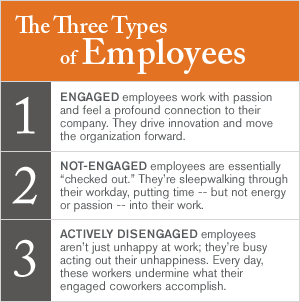Beyond the business reasons, there is a human reason to focus on engagement.
When studying the impact of engagement on a person's overall well-being, A research shows that engaged employees are twice as likely to be thriving in their overall lives and report having lower levels of:
- stress
- anxiety and depression
- bad cholesterol
It is easy to underestimate the influence of your career on your overall well-being. But when you don't like what you do each day and are not involved in, enthusiastic about and committed to your work, you have less energy, your productivity suffers, you take more sick days and you experience higher levels of stress.
For Employee Well-Being, Engagement Trumps Time Off
For companies trying to choose between improving employee engagement and boosting workforce well-being, This research provides good news. "Employers can improve both aspects at the same time," What's more, the research strongly suggests that "the nature of the work environment may have more of an effect than workplace policies on overall well-being,"
The researchers weren't surprised to find higher levels of well-being among engaged employees.
Employee engagement is a much stronger predictor of overall well-being than factors such as hours worked, weeks of vacation time taken, and flextime allowed, according to new research, The study, which used a sample of 4,894 U.S. Panel members who work full time, explored the relationships among employee engagement, hours worked, flextime, vacation time, and well-being.
Researchers weren't surprised to find higher levels of well-being among engaged employees. Nor were they surprised to find that that engaged workers were substantially more likely to say that their employer offers "a lot" or "some" flextime -- or that engaged employees work slightly more hours than do their actively disengaged or not engaged counterparts.
Quality of the workplace is more important than company policies

Though workplace policies such as hours worked, vacation time, and flextime do relate to employee well-being, the quality of the workplace trumps policy in affecting overall well-being. "Though vacation time and flextime were associated with higher well-being," Agrawal says, "those who were engaged in their work but took less than one week of vacation had 25% higher overall well-being than actively disengaged employees, even those with six or more weeks of vacation." And workers who took four weeks of vacation had only about 7% higher overall well-being compared with those who took one week of vacation.
Flextime had the strongest relationship to overall well-being. Engaged employees with a lot of flextime have 44% higher well-being than actively disengaged employees with very little or no flextime. And among employees who are actively disengaged or not engaged, those with flextime have higher overall well-being.
The study also shows that an engaging work environment boosts the odds of high well-being regardless of workplace policy. What matters most is employee engagement. "Fewer hours, more vacation time, and flextime cannot fully offset the negative effects of a disengaging workplace on well-being,".

0 comments:
Post a Comment
Note: Only a member of this blog may post a comment.